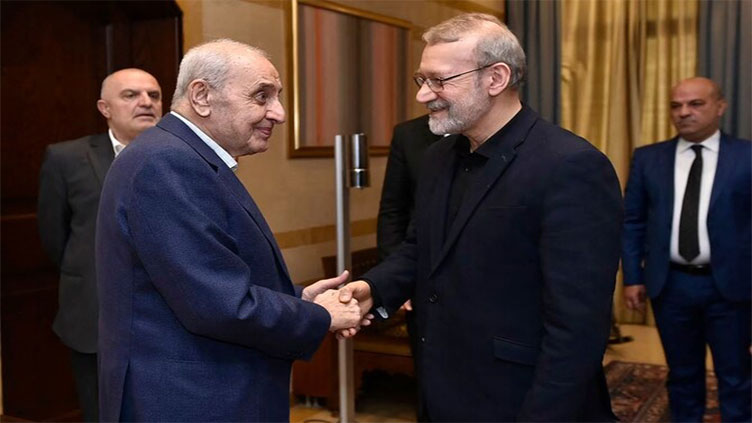Iran backs Lebanon in ceasefire talks, seeks end to 'problems'

World
Iran will back any decision taken by Lebanon in talks to secure a ceasefire with Israel.
BEIRUT (Reuters) - Iran will back any decision taken by Lebanon in talks to secure a ceasefire with Israel, a senior Iranian official said on Friday (Nov 15), signalling Tehran wants to see an end to a conflict that has dealt heavy blows to its Lebanese ally Hezbollah.
Israel launched airstrikes in the Hezbollah-controlled southern suburbs of Beirut, flattening buildings for a fourth consecutive day. Israel has stepped up its bombardment of the area this week, an escalation that has coincided with signs of movement in US-led diplomacy towards a ceasefire.
Two senior Lebanese political sources told Reuters that the US ambassador to Lebanon had presented a draft ceasefire proposal to Lebanon's parliament speaker Nabih Berri the previous day. Berri is endorsed by Hezbollah to negotiate and met the senior Iranian official Ali Larijani on Friday.
Asked at a news conference whether he had come to Beirut to undermine the US truce plan, Larijani said: "We are not looking to sabotage anything. We are after a solution to the problems."
"We support in all circumstances the Lebanese government. Those who are disrupting are Netanyahu and his people," Larijani added, referring to Israeli Prime Minister Benjamin Netanyahu.
Hezbollah was founded by Iran's Revolutionary Guards in 1982, and has been armed and financed by Tehran.
One major sticking point is Israel's demand to retain freedom to act should Hezbollah violate any agreement - a demand Lebanon has rejected.
Israel launched its offensive against Hezbollah after almost a year of cross-border hostilities ignited by the Gaza war, declaring it wanted to secure the return home of tens of thousands of people forced to evacuate from northern Israel.
Israel's campaign has forced more than 1 million people to flee their homes in Lebanon, igniting a humanitarian crisis.
It has dealt Hezbollah serious blows, killing its leader Sayyed Hassan Nasrallah and other commanders, using airstrikes to pound areas of Lebanon where Hezbollah has political and military sway, and sending troops into the south.
Hezbollah has kept up rocket attacks into Israel and its fighters have been battling Israeli troops in the south.
FLATTENED BUILDINGS
It has dealt Hezbollah serious blows, killing its leader Sayyed Hassan Nasrallah and other commanders. Hezbollah has kept up rocket attacks into Israel and its fighters have been battling Israeli troops in the south.
On Friday, Israeli airstrikes flattened five more buildings in Beirut's southern suburbs known as Dahiyeh. One of them was located near one of Beirut's busiest traffic junctions, Tayouneh, in an area where Dahiyeh meets other parts of Beirut.
The sound of an incoming missile could be heard in footage showing the airstrike near Tayouneh. The targeted building turned into a cloud of rubble and debris which billowed into the adjacent Horsh Beirut, the city's main park.
The Israeli military said its fighter jets attacked munitions warehouses, a headquarters and other Hezbollah infrastructure. Ahead of the latest airstrikes, the Israeli military issued a warning on social media identifying buildings.
The European Union strongly condemned the killing of 12 paramedics in an Israeli strike near Baalbek in the Bekaa Valley on Thursday, EU foreign policy chief Josep Borrell said.
"Attacks on healthcare workers and facilities are a grave violation of international humanitarian law," he wrote on X.
On Thursday, Eli Cohen, Israel's energy minister and a member of its security cabinet, told Reuters prospects for a ceasefire were the most promising since the conflict began.
The Washington Post reported that Netanyahu was rushing to advance a Lebanon ceasefire with the aim of delivering an early foreign policy win to US President-elect Donald Trump.
According to Lebanon's health ministry, Israeli attacks have killed at least 3,386 people through Wednesday since Oct 7, 2023, the vast majority of them since late September. It does not distinguish between civilian casualties and fighters.
Hezbollah attacks have killed about 100 civilians and soldiers in northern Israel, the Israeli-occupied Golan Heights and southern Lebanon over the last year, according to Israel.


